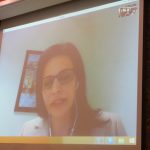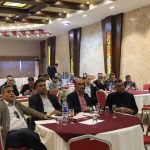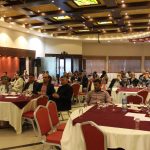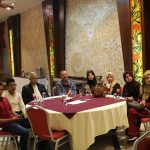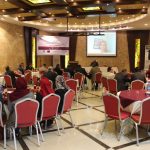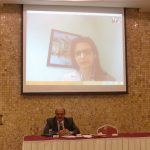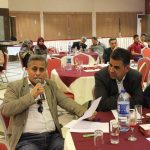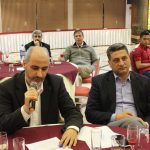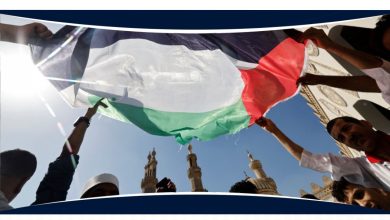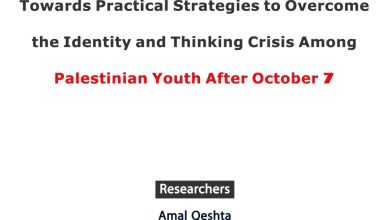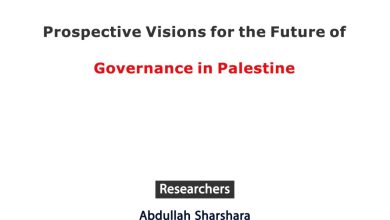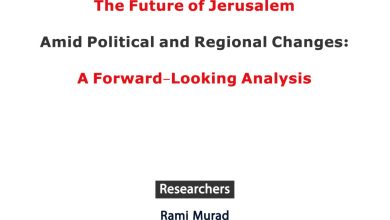Diplomacy & Israeli Accountability: by Ms. Zaha Hassan
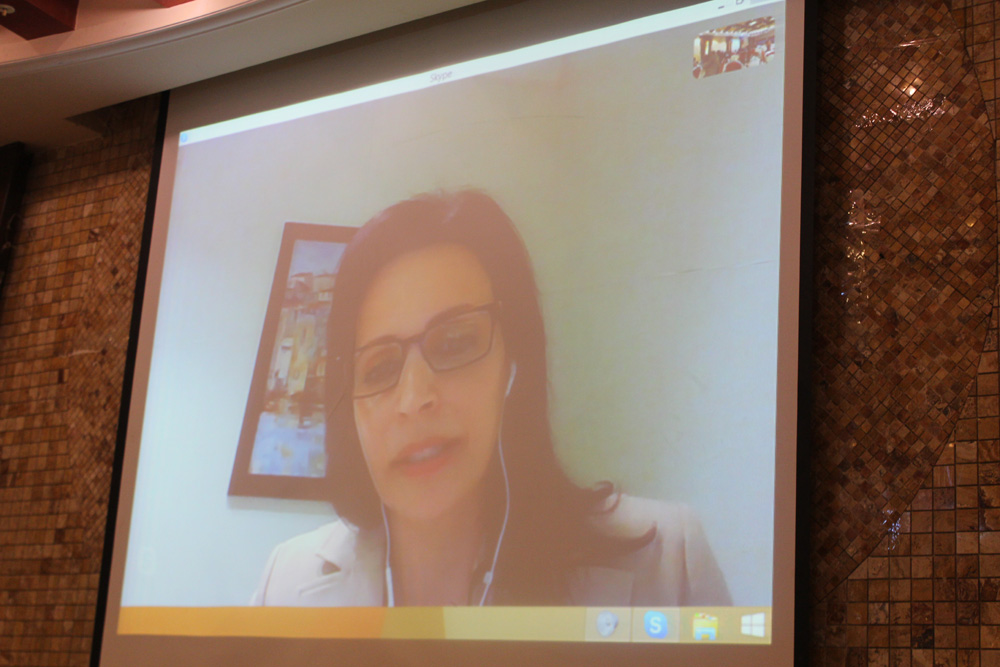
Date: Monday, April 8, 2019, 18:00
Location: Light-House Hotel, Gaza City, Palestine.
Background:
“Building Strategic Capacity: Empowering Civil, Political and Emerging Constituencies in Palestine and Israel” is an EU Peacebuilding Initiative-funded project that develops the ongoing work of the Palestine Strategy Group (PSG), the Palestinian Citizens of Israel Group (PCIG) and the Israeli Strategic Forum (ISF). This roundtable discussion was part of the PSG dimension of the project. Since being founded in 2008, the PSG has produced a considerable number of studies and strategic reports on the Palestinian issue. In cooperation with Pal-Think for Strategic Studies, the Palestinian Center for Israeli Studies (MADAR) and Oxford Research Group, the PSG will produce 12 research papers between 2017 and 2020 which deal with multiple themes and perspectives that then culminates in the publication of the Strategic Policy Manual “Palestine 2020”. This policy report will be presented at a major conference in Ramallah in 2020 and incorporate all the findings of the 12 PSG research papers as well as conclusions of the PCIG.
Workshop’s Attendees:
The roundtable was conducted in the Gaza strip. Attendees included Dr. Nasser Al-Yafawi as a moderator. Ms. Zaha Hassan is a human rights lawyer and visiting fellow at the Carnegie Endowment for International Peace. Her research focus is on Palestine-Israel peace, the use of international legal mechanisms by political movements, and U.S. foreign policy in the region. And also, a diverse combination of 47 participants including journalists, professors, activists, intellectuals, writers, political analysts, and college students. Besides, 16 of the attendees were less than 30 years old, and 31 of them were above 30 years old. Only 10 female participants attended whilst 37 were male.
Moderator Contribution:
Dr. Al-Yafawi noted that this roundtable is part of Pal-Think’s continued project with ORG and the PSG within the EU Peacebuilding initiative “Building Strategic Capacity: Empowering Civil, Political and Emerging Constituencies in Palestine and Israel.” Last year, the project tackled issues related to Palestine internally and on the Israeli agenda and then covered Palestine in the region, and now presenting policy papers related to Palestine on the international agenda. Ultimately, all the policy papers written will be presented at the conference in 2020. The policy paper of this session is Diplomacy & Israeli Accountability: Multilateral Peace-making: The Framework, Scope and Stakeholders (e.g., assessing US-led efforts and monopoly and reengaging multi-lateral track) written by Ms. Zaha Hassan.
Ms. Zaha Hassan Contribution:
The researcher began talking about four main things:
- The role of the United States of America in the negotiations.
- The US foreign policy.
- Lessons learned from multilateral peace initiatives.
- Imagining scenarios of multilateral peace initiatives, especially moving the US Embassy to Jerusalem and the recognition of Israel’s sovereignty over the Golan, and other U.S actions in favor of Israel.
The features of the U.S interaction with the Palestinian-Israeli conflict are:
- There is no direct contact with the Palestinian leadership regarding any future peace initiatives.
- S does not recognize the PLO in the process of negotiations and consider it a terrorist organization
- The Palestinians have no right to be part of the settlement equation in the region.
Ms. Hassan explained that the US Congress had passed three laws to determine interaction with the Palestinian cause and that stressed on the fact that there is no Palestinian-Israeli peace without the U.S being involved. However, she confirmed that this is not true, primarily that the Oslo accords was not through the U.S and also in Taba 2001 we were close of having peace process for the conflicting parties without the U.S being part of that process. She also stated that it is not necessary that the U.S is part of a peace process. The U.S has always posed an obstacle to the peace process, and its foreign policy towards the Palestinian-Israeli conflict did not change much over the years, from Carter to Trump, it is the same perspective based on autonomy. The U.S foreign policy regarding the conflict was always in favor of the Israelis at the expense of Palestinians’ rights. For example, Clinton said that Israeli neighborhoods must remain Jewish and denied the right of return for Palestinian refugees. Also, President Bush considered the settlements legitimate, and there was no right to remove them. Obama also did not support a Palestinian state based on 1967, and the Palestinians have to recognize the Jewish state. It does not matter whether the U.S administration is Democratic or Republican because the U.S foreign policy has not changed toward the Palestinian-Israeli conflict.
U.S foreign policy:
- For the Republican Party, a two-state solution is considered no longer valid.
- The idea of a Palestinian state and an Israeli state is a subject of intense debate between the two parties.
- The Democrats still support the two-state solution, but without a working policy in place to organize the relationship with Israel to achieve a Palestinian state. In fact, Democrats supporting two-state solution does not mean that they will do anything on the ground to make peace happen. Above all, there are movements by those Democrats with who are inclined to the left and who want to make a change in U.S foreign towards Palestinians.
Ms. Hassan referred that a broad debate on U.S foreign policy towards the Palestinian-Israeli conflict is expected in the 2020 elections. However so far there are no significant expectations. A more critical factor is the public opinion in the U.S, which support U.S sanctions on Israel unless Israel submits to peace initiatives.
Multilateral peace initiatives:
First: If the U.S participated in regional peace initiatives; it would monopolize the negotiation process.
Second: if the UN has participated in multilateral peace agreements, the UN is abided by, and its role is limited by international law
Third: if the European Union takes part in such multilateral efforts, its position will be limited by the European countries’ consensus.
Fourth: Russia’s involvement in such efforts is not expected since it is not able to counterbalance the U.S in the region.
Regarding the geopolitical situation, Israel is more inclined towards the far-right and PLO will not be part of any negotiations without the U.S accepting back the two-state solution. Palestinians will suffer economic hardships because of the U.S financial aid cuts to international organizations provide aids for Palestinian refugees. Therefore, it is necessary for any multilateral peace initiative in the region to include the economic aspect of the Palestinian issue. For the U.S, it will continue its policy “America first,” and the EU will not replace the U.S in the settlement process. Arab countries are trying to separate themselves from the U.S and Israeli policy regarding the conflict and keep good ties with Israel, with countries like Russia and China are increasingly cooperating and acting as rivals of the United States in the region. Both Russia and China are trying to balance relations with both Israel and Arab countries. Besides, the Swiss government should activate the Fourth Geneva Convention to form a task force that prevents the annexation of land from the West Bank. Moreover, the role of Multilateral efforts is not only to prevent the annexation of the land but also to develop an international consensus through international bodies like ICJ. All these together will pave the path for a future fair and just settlement of the conflict.
Attendees’ Comments & Questions:
- Dr. Wajih Abu Zarifa— I think that the U.S is trying to change the parameters of the conflict by imposing specific facts on the peace process, that was obvious when the U.S moved its embassy to Jerusalem. The unfair non-recognition of Palestinian refugees and significant changes in the U.S foreign policies towards the Palestinian-Israeli conflict by Trump’s administration. Unfortunately, Palestinians are not ready to find an alternative peace mediator to the U.S.
- Dr. Osama Antar— I think we need new economic and political mechanisms that strengthen the Palestinian steadfastness in the face of plans that target the Palestinian cause and it would be great if your paper can touch upon: how can the Palestinians overcome these economic and political obstacles specifically in the coming future?
- Mr. Nehad Al Khatib— What initiatives should the Palestinians come up within the current challenges in the region, created by Trump’s administration?


